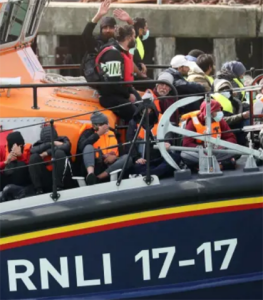UK public supports lifeboat rescues of asylum seekers
After being attacked by right-wing groups for rescuing asylum seekers crossing the English Channel, Britain’s lifeboat service has seen a record increase in cash donations from the public.
The UK’s Royal National Lifeboat Institution (RNLI) is set to reach for the highest annual fundraising total in its near 200-year history.
 Donations spiked after a groundswell of public support following attacks from right-wing groups and commentators for helping save the lives of asylum seekers at risk of drowning in the Channel.
Donations spiked after a groundswell of public support following attacks from right-wing groups and commentators for helping save the lives of asylum seekers at risk of drowning in the Channel.
Online donations alone rose by 50 per cent this year.
Founded in 1824, the UK’s network of volunteer lifeboats has been inundated with donations and messages of support after high-profile attacks from the likes of UKIP founder Nigel Farage who deemed the charity “woke” for fulfilling its humanitarian mission to save lives at sea.
At the height of the attacks in November, a group of fishermen attempted to block a lifeboat from going to rescue asylum seekers just days before 27 people drowned in a single incident.
The RNLI fundraising boss Jayne George said the hostility has had the opposite effect of what its instigators intended.
“We’ve had a better response to almost everything that we’ve done in 2021. At the end of the year, we’re going to have more members, we’re going to have more cash donors and more people who give to us via direct debit,” Ms George told UK media.
She said the charity’s database of supporters had also grown, with the organisation now in regular contact with 300,000 people.
“We can’t help but notice that it’s a really divisive issue that’s in the news almost daily. Whatever the negatives, the positive is that it brings out this significant reaction in terms of people wanting to support us, particularly our work in the eastern Channel,” Ms George said.
“Our core purpose is humanitarian – we exist to save everyone,” she said.
Channel crossings have become one of the most politicised issues in British politics, with UK Home Secretary, Priti Patel, promising a crackdown as almost 28,000 people arrived in small boats last year, compared with around 8,400 in 2020.
Ms Patel’s controversial borders bill intends to reduce numbers and, until recently, contained proposals that appeared to criminalise organisations such as the RNLI for rescuing asylum seekers in the Channel.
Despite repeated assertions from the UK government that it is heavily targeting small boat crossings, a parliamentary report last month said the government’s operations in the Channel “rely heavily on voluntary organisations, such as the RNLI, or independent lifeboats”.












